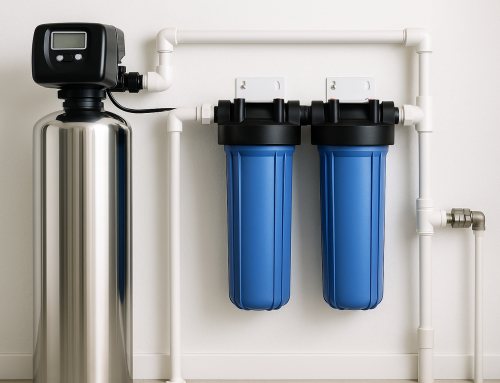Water is essential for life, but not all water reaching our homes is as clean as it appears. In many areas, drinking water contains naturally occurring minerals and metals that, while harmless in small amounts, can cause long-term health concerns and damage household plumbing and appliances when present at elevated levels.
Understanding what minerals are in your water and how they affect your body and home is the first step toward improving water quality and protecting your family.
Common Minerals Found in Drinking Water
Calcium and Magnesium (Hard Water)
Calcium and magnesium are the most common minerals found in household water supplies and are responsible for what is known as hard water. While both minerals are essential nutrients, excessive levels can cause significant problems.
Hard water leads to scale buildup in pipes, water heaters, and appliances, reducing efficiency and increasing energy costs. It can also leave skin and hair feeling dry and irritated. In addition, hard water reduces the effectiveness of soaps and detergents, causing homeowners to use more product for cleaning and laundry.
Iron and Manganese
Iron and manganese occur naturally in groundwater and can create noticeable water quality issues. These minerals often cause reddish or black stains on sinks, toilets, clothing, and appliances. They can also give water a metallic taste and unpleasant odor.
At higher concentrations, iron and manganese may cause gastrointestinal discomfort and can contribute to pipe blockages and buildup within plumbing systems.
Sodium
Sodium may enter drinking water naturally through mineral deposits or as a result of water softening processes. While low sodium levels are generally safe, elevated levels can be a concern for individuals with high blood pressure, heart disease, or kidney conditions. Monitoring sodium levels in drinking water is especially important for those on restricted diets.
Lead and Other Heavy Metals
Lead is one of the most dangerous contaminants that can be present in drinking water, particularly in homes with older plumbing systems. Long-term lead exposure is linked to serious health risks, including neurological damage, developmental delays in children, and organ damage in adults.
Other heavy metals such as arsenic and mercury may also be present in water due to natural deposits or industrial contamination. Chronic exposure to these metals can increase the risk of cancer, cardiovascular disease, and other long-term health conditions.
How Minerals in Water Affect Your Health and Your Home
Consuming water with elevated mineral levels over time can have lasting health consequences. Excess calcium and magnesium may contribute to kidney stones and digestive discomfort, while heavy metals like lead and arsenic can accumulate in the body, leading to chronic illness and organ damage.
Beyond health concerns, mineral-rich water can significantly impact your home. Scale buildup from hard water reduces the efficiency of water heaters, dishwashers, and washing machines, leading to higher energy bills and frequent repairs. Plumbing systems may also suffer from reduced water flow and corrosion over time.
How a Water Purification System Can Improve Water Quality
The good news is that modern water purification systems are designed to target specific contaminants and minerals, providing cleaner, safer water for your household.
Water Softeners
Water softeners remove calcium and magnesium, eliminating hard water issues. By preventing scale buildup, these systems extend the lifespan of appliances, improve water flow, and reduce soap and detergent usage.
Sediment and Activated Carbon Filters
Sediment filters remove particles such as sand, dirt, and rust, while activated carbon filters reduce chlorine, organic compounds, and chemical contaminants. These systems also improve water taste and odor, making water more pleasant to drink and cook with.
Reverse Osmosis Systems
Reverse osmosis systems provide advanced filtration by removing up to 99% of contaminants, including sodium, lead, arsenic, and other heavy metals. This technology delivers exceptionally pure drinking water and is ideal for households concerned about long-term health risks.
UV Filtration Systems
UV filtration systems use ultraviolet light to destroy harmful bacteria, viruses, and microorganisms. When combined with other filtration methods, UV systems help ensure water is microbiologically safe without adding chemicals.
Final Thoughts
Minerals in water may not always be visible, but their effects on your health and home can be significant. Investing in a water purification system provides peace of mind by ensuring your water is clean, safe, and free from harmful contaminants.
By identifying the minerals in your water and choosing the right treatment solution, you can protect your family’s health, extend the life of your appliances, and enjoy better-tasting water every day.






